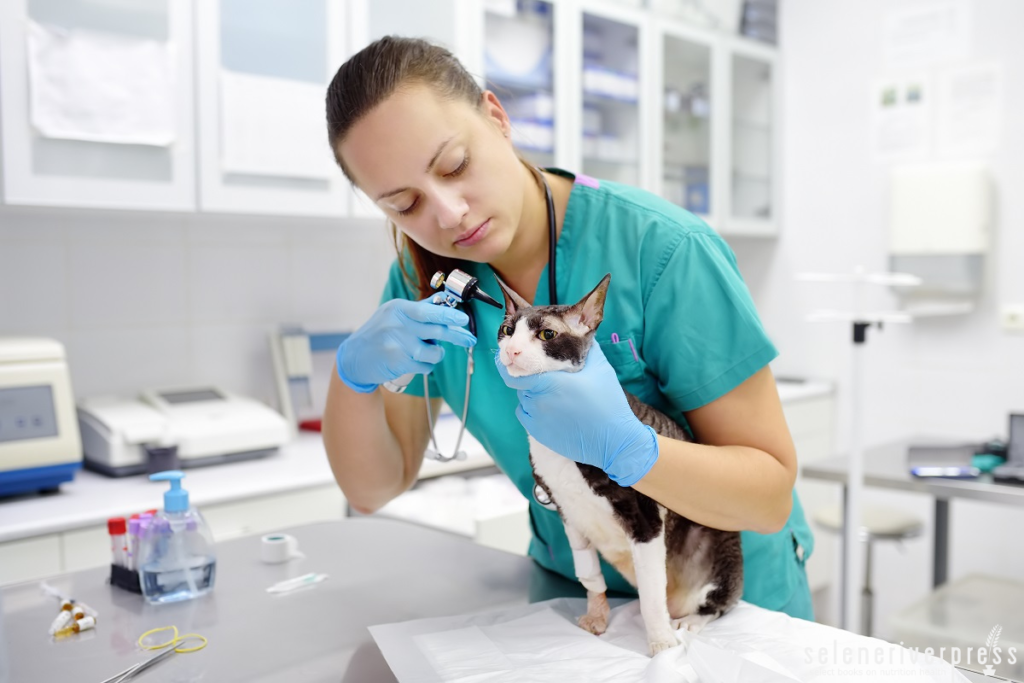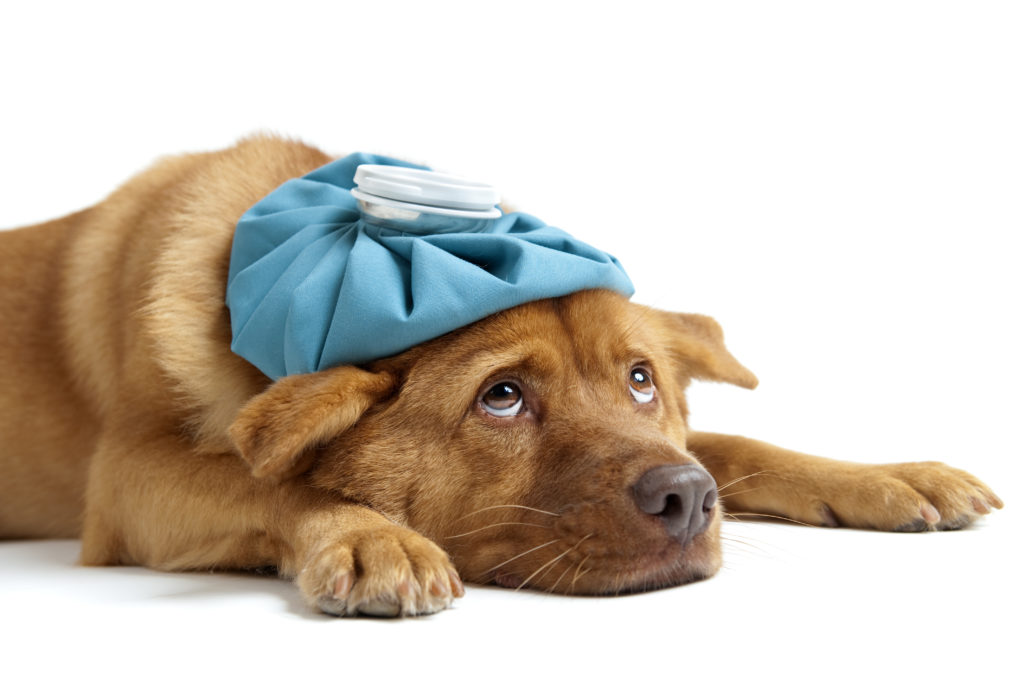It can be difficult to know when our pets aren’t feeling well. Sure, we might notice some obvious symptoms such as shaking, panting, crying, loss of appetite, lameness, stiffness after rest, a change in posture, aggression or a grumpy temperament, excessive licking and scratching a specific area, a difference in how they play, or a decreased interest in interacting or exercise. Sometimes they may even hide from us. Unfortunately, our pets can’t use words to tell us when they don’t feel good, and due to our busy lives we may miss some of the subtler signs of distress. This is why an annual checkup from the veterinarian is so important.
The annual checkup gives the veterinarian the opportunity to run blood work, get fecal analysis and urinalysis, palpate, and perform a thorough physical exam. It’s also the perfect time to bring up any concerns you might have, such as poor hair coat, digestive issues, dental concerns, and behavioral problems. (Some behavioral problems can be a sign that your pet doesn’t feel good or something else isn’t quite right.)
What to expect. When you first arrive at the clinic, your pet will be weighed to check for significant weight gain or loss. In the exam room, the veterinarian or triage technician will note temperature, pulse, and respiration (TPR). This is a great time to discuss the past year and bring up any concerns you might have.
Eyes. During the physical exam, the veterinarian focuses on a variety of issues, starting at the head. They look at the eyes to observe alertness, note the color of the sclarea (white part of the eyes), observe the pupils, and check for discharge or other irritations.
Ears. They will use an otoscope to examine the ears both externally and internally, removing excess wax or debris, ruling out yeast or bacterial infections, and checking for ear mites or foreign objects.
Mouth. Then we move on to the mouth, looking for tartar, growths, infection, broken teeth, foul breath, etc. The color of the gums and capillary refill time (which can be an indication of more serious illnesses) will also be checked.
Lymph nodes. The lymph nodes are also checked. Sometimes dogs don’t show any symptoms of swollen lymph nodes, making it difficult for their owners to notice any inflammation. There are five locations on dogs that you can usually detect enlarged lymph nodes: mandibular (under the chin on either side of the neck); popliteal (on the back of the hind legs, behind the knees); prescapular (on the chest in front of the shoulders); and swelling in one of the legs or near the armpit, which can cause pain or limping.
Palpating. Then we move down the body. The exam includes palpating, or feeling the abdomen, to help assess if the bladder, kidneys, liver, intestines, spleen, and stomach appear normal or abnormal, and whether there is any subtle evidence of discomfort.
Haircoat. The vet will also examine the haircoat, running their hands along the sides, back, and underneath to check for lumps and bump and making sure the coat is healthy, shiny, and free of parasites.
Lab work. Now we move on to lab work. In most clinics the typical yearly exam will consist of a uranalysis, CBC, fecal work, a heartworm test (depending on the geographic location), and a basic chemistry panel (generally if your pet is older or has a preexisting condition). You might be wondering why these tests are needed every year. Getting blood work done early on in life can give a good baseline as your pet ages. It can also address any concerns that arise over time and allow for an early intervention. This becomes even more important as pets get older. As we all know, our pets age much more quickly than humans.
Blood work. Let’s take a look at a complete blood count (CBC). This test provides information about different cell types in the blood: red blood cells (which carry oxygen to the tissues); white blood cells (which help fight infection and inflammation); and platelets (which help the blood to clot). The CBC provides details about the number, size, and shape of the various cell types and identifies the presence of abnormal cells. In addition, the CBC can reveal anemia, infection, hydration status, blood-clotting ability, and immune system response. This routine test is used in all stages of health and illness and can indicate the presence of many forms of disease.
Biochemistry profile. If your animal is older or has a surgical procedure in the future, the vet may recommend a biochemistry profile. This panel of tests provides information about the organs and tissues of the body and helps detect diabetes, kidney disease, liver disease, and other disorders. If minor abnormalities are found on the biochemistry profile, your veterinarian may suggest that the tests be repeated in a few days, weeks, or months. If the abnormalities are more serious, a more extensive diagnostic workup may be recommended, including an expanded biochemistry profile and imaging tests, radiographs (X-rays), or an ultrasound.
Urinalysis. A urinalysis is an easy, cheap, and vital initial diagnostic test. Complete urinalysis includes the examination of color, odor, turbidity, volume, pH, specific gravity, protein, glucose, ketones, blood, erythrocytes, leukocytes, epithelial cells, casts, crystal, and organisms. All of this provides information about how well the kidneys are working and identifies signs of inflammation and infection in the urinary system. It can also help detect diabetes and is useful in the diagnosis of cancer within the urinary system.
Heartworm. Not every pet needs a heartworm test so check with your veterinarian to see how prevalent this deadly parasite is where you live. Transmitted through mosquito bites, heartworm can live in the heart, arteries, and lungs of dogs and cats. A blood test can reveal of your pet has the parasite. Cats usually require additional diagnostics as well. Once the test shows that your pet is heartworm free, they should be put on a monthly preventive treatment. In some parts of the country, pets are kept on preventative treatments year-round, but in other locations they are treated just during the mosquito season.
Fecal sample. Finally, there is the well-known fecal sample. Some vets recommend annual fecal testing for parasites. This is especially true if you take your pet to places that may have a high incidence of canine gastrointestinal parasites (both worms and protozoans such as giardia). These locations can include municipal city parks and public areas, pet-grooming parlors, boarding and daycare facilities, dog shows, and dog parks, ponds, lakes, creeks, and streams close to heavily populated areas. Puppies and animals with gastrointestinal issues may need more frequent fecal testing.
Nutritional deficiencies. Open-minded veterinarians with a more holistic approach understand the importance of addressing the body as a whole. Along with the standard examination I discuss above, they may point you to alternative assessments for diagnosis and treatment. These can include the use of muscle testing or the Heart Sound Recorder to look for nutritional deficiencies.
Nutritional deficiencies can cause multiple systems to fail or perform inadequately, but proper nutrition allows the body to rebuild and repair. I work with many veterinarians who understand this concept and offer Standard Process whole food supplements. It’s a great way to help close the nutritional gap caused by overprocessed pet food, nutrient-depleted soil, and synthetic vitamins.
Help give your pet the proper nutrients as nature intended. If they are not taking Standard Process supplements, the yearly exam is a perfect time to talk to your veterinarian about the SP products that may work best. A very wise veterinarian once told me that every breathing animal should be on Canine Whole Body Support or Feline Whole Body Support, and it’s only when they are no longer breathing should you discontinue the product.
All joking aside, he’s right. It’s much easier to maintain good health than it is to recover from an illness or disease after it sets in. During the annual exam, your veterinarian may pick up on the slightest abnormalities. Addressing them early with proper nutrition can make a world of difference in the health and future of your pet’s well-being.
Don’t hesitate to take your pet in for their yearly exam. You’ll be giving them the best chance to live a happy, healthy life well into their geriatric years.
Images from iStock/SbytovaMN (main), WebSubstance(dog with ice pack on head), damedeeso (dogs under the blanket).
 Get self-health education, nutrition resources, and a FREE copy of A Terrible Ten: Health Foods That Ain't ebook.
Get self-health education, nutrition resources, and a FREE copy of A Terrible Ten: Health Foods That Ain't ebook.


